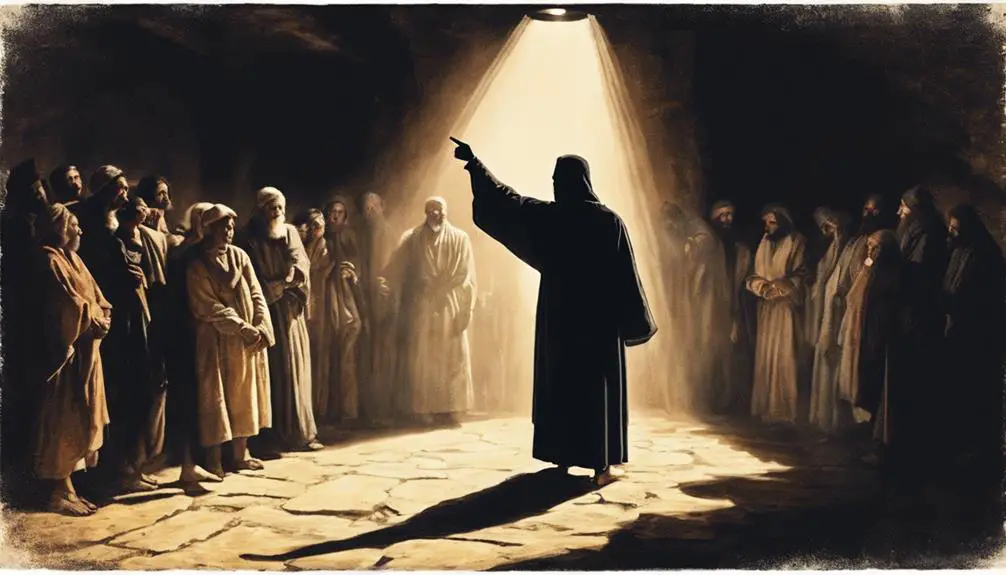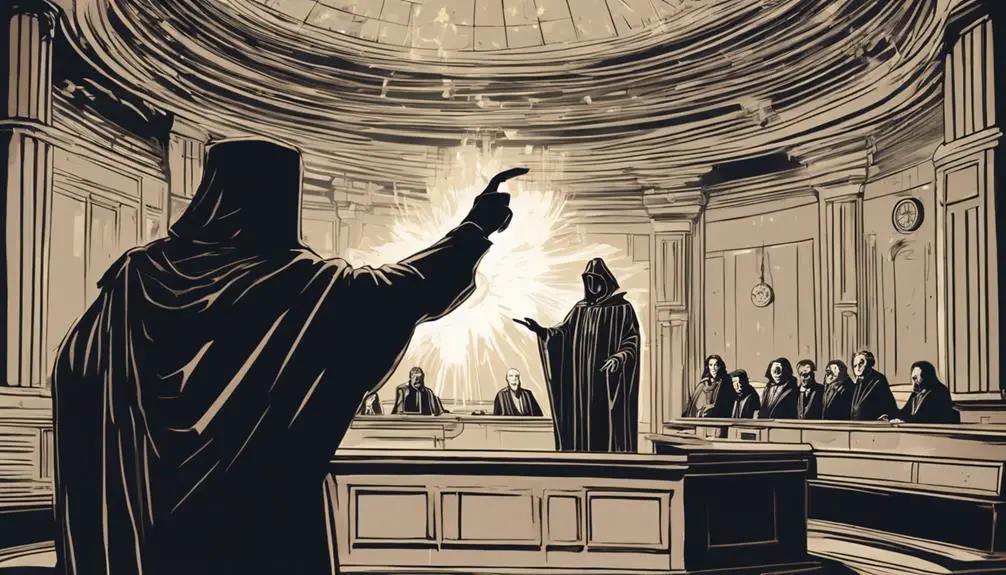Biblical narratives reveal the Accuser, a pivotal figure of temptation and morality, whose story unfolds a complex tapestry of faith and redemption.

Who Is the Accuser in the Bible
In the digital age, you might find it fascinating to explore an ancient title: the Accuser in the Bible, often identified as Satan. This figure plays a pivotal role as God's prosecutor, presenting the moral failures of humans.
Throughout the scriptures, from the poetic disputes in Job to the tempting of Jesus in the desert, Satan's role evolves from a celestial accuser to a symbol of temptation and opposition. You'll discover how this transformation reflects broader theological implications and how individuals are encouraged to overcome accusations through faith and virtue.
This journey into biblical narrative and symbolism offers a unique lens to understand the concept of moral struggle and redemption, compelling you to consider the depth of these ancient texts in a new light.
Key Takeaways
- Satan is traditionally viewed as the 'accuser' in the Bible, challenging divine authority and human fidelity.
- The role of accuser is linked to Satan's rebellion and desire for autonomy, as depicted in Isaiah 14:12-15 and Ezekiel 28:12-17.
- Biblical narratives use accusation, such as false witnesses, to explore themes of justice, mercy, truth, and deceit.
- Overcoming accusations in the Bible emphasizes forgiveness, spiritual resilience, and a deeper relationship with the divine.
The Origin of Satan

In exploring the origin of Satan, it's crucial to delve into the complex layers of scriptural narratives and theological interpretations that have shaped this figure's conception. Traditionally, Satan is viewed as a fallen angel, but understanding the reasons behind this fall and the implications thereof necessitates a closer examination. The concept of Satan as a fallen angel primarily emerges from interpretations of texts such as Isaiah 14:12-15 and Ezekiel 28:12-17, though these passages don't explicitly name Satan. The imagery of a once-honored being cast down due to rebellion has been linked to Satan, suggesting a narrative of pride, ambition, and ultimate downfall.
The cause of this rebellion is often attributed to a desire for autonomy or a challenge to divine authority, positioning Satan in direct opposition to God. This narrative framework not only establishes Satan's origin but also sets the stage for his roles and actions throughout biblical texts. It's important to note, however, that these interpretations aren't universally accepted and are subject to scholarly debate. The development of Satan's character and story has been influenced by various cultural, theological, and literary factors over time.
Understanding the origin of Satan as a fallen angel due to rebellion provides critical context for his subsequent actions and motivations as depicted in religious texts. This foundational aspect emphasizes the complex nature of Satan's character, reflecting broader themes of authority, morality, and resistance that resonate throughout biblical literature.
Satan's Role as Accuser

Satan's designation as the 'accuser' plays a pivotal role in biblical narratives, reflecting his function in challenging both divine authority and human fidelity. This title, among others, underscores his adversarial role within the cosmic framework, positioning him as a central figure in the examination of morality and faith. Through the lens of his actions and titles, you're invited to explore the multifaceted nature of accusation in a theological context.
The implications of Satan's titles, particularly that of the 'accuser', extend beyond mere nomenclature. They encapsulate a profound understanding of his role in the divine economy as one who not only opposes but also tests the integrity of human beings. His actions, driven by the intent to accuse, serve as a catalyst for the revelation of true character and devotion, both to fellow humans and to the divine. This aspect of accusation effects a dual-purpose mechanism: it exposes vulnerabilities and, simultaneously, opportunities for redemption.
Analyzing Satan's role from this perspective, you uncover a complex interplay between divine justice and mercy. The act of accusation, while inherently confrontational, also embodies a necessary function within the divine narrative—a means through which the depth of faith can be measured and, ultimately, strengthened. It's within this dynamic that the character of Satan, as the accuser, assumes a paradoxical role. While his actions are often viewed in a negative light, they inadvertently contribute to the fulfillment of divine purpose, testing and refining the faith of individuals.
In understanding Satan's role as accuser, you're offered insight into the broader theological discourse on the nature of evil, temptation, and the human condition. This analysis not only enriches one's grasp of biblical literature but also fosters a nuanced appreciation of the complexities inherent in the concepts of justice, redemption, and divine providence.
Biblical Accounts of Accusation

Accusation threads through biblical narratives, revealing complex layers of moral and spiritual testing faced by figures across both Old and New Testaments. Delving into these accounts, you observe a recurring motif where individuals and groups face trials orchestrated through accusations, both true and false. This scrutiny underlines the profound impact of allegations on the lives of biblical characters and offers insights into the nature of justice, truth, and redemption.
Notably, the story of Joseph and his brothers exemplifies the devastating effects of false accusations. Joseph's brothers, envious of his favored status, conspire against him, casting him into a pit and then selling him into slavery. This act of betrayal initiates a series of events where Joseph faces further accusations, including Potiphar's wife's false claim of assault, which lands him in prison. Despite being a victim of false witnesses, Joseph's journey illustrates the complexities of accusation and its consequences on an individual's destiny.
The use of false witnesses is a tactic that reappears in various forms throughout the scriptures. It serves as a powerful tool for manipulation and injustice, often employed by those seeking to undermine the truth or achieve personal gain at the expense of others. These accounts not only highlight the moral failings of the accusers but also prompt a deeper reflection on the themes of forgiveness, resilience, and divine providence.
Through these narratives, the Bible exposes the nuanced dynamics of accusation, inviting readers to ponder the delicate balance between justice and mercy, truth and deceit.
Overcoming the Accuser

Throughout biblical narratives, individuals frequently confront and surmount accusations, embodying themes of resilience and divine justice. This resilience isn't merely a testament to human will but also illustrates profound spiritual strategies for overcoming the accuser. One such strategy is the application of forgiveness strategies, which serve as a cornerstone in the process of overcoming accusations. Forgiveness, in this context, isn't merely an act towards others but also a self-directed gesture, allowing individuals to free themselves from the chains of guilt and shame that accusations often bring.
Central to the battle against the accuser is the development of spiritual resilience. This resilience is cultivated through a deep, personal relationship with the divine, rooted in faith and trust. It's about standing firm in one's beliefs, even when faced with false accusations, understanding that divine justice prevails above all. The narratives suggest that spiritual resilience empowers individuals not only to withstand accusations but to emerge from them strengthened and more deeply connected to their spiritual beliefs.
Moreover, overcoming the accuser often involves a process of introspection and self-improvement. It's an acknowledgment that, while some accusations may be unfounded, every challenge is an opportunity for growth. This perspective encourages a proactive stance towards personal development, aligning one's actions and thoughts more closely with spiritual ideals.
In essence, overcoming the accuser in biblical terms is a multifaceted process, incorporating forgiveness strategies and the cultivation of spiritual resilience. It's a journey that demands faith, introspection, and a steadfast commitment to growth, anchored in the belief that divine justice ultimately prevails.
Theological Implications

Exploring the theological implications of overcoming the accuser reveals profound insights into the nature of divine justice and human redemption within biblical narratives. When you delve into these texts, you encounter a complex interplay between divine justice and free will, elements central to understanding the human condition and God's relationship with humanity.
Divine justice, as portrayed in these narratives, isn't merely about punishment or retribution; it's about restoration and reconciliation. It's a concept that transcends human notions of fairness, emphasizing a justice that's ultimately restorative rather than punitive. This perspective invites you to reconsider your understanding of justice, viewing it through a lens that prioritizes healing and redemption.
Free will plays a pivotal role in this context. The ability to choose, even to err, is a gift that underscores the value of human autonomy in the divine narrative. It's through exercising free will that individuals often encounter the accuser, facing trials and temptations. Yet, it's also through free will that redemption is possible. This duality highlights the intricate relationship between human agency and divine providence.
The process of overcoming the accuser, therefore, isn't just a battle against external forces; it's an internal journey towards understanding and embracing divine justice. It's about recognizing the power of choice and the potential for redemption, regardless of past transgressions. This journey underscores the profound love and mercy at the heart of the divine, offering a path to restoration that's open to all who seek it, a testament to the enduring hope and grace that underpin the biblical narrative.
Frequently Asked Questions
How Do Different Religious Traditions Outside of Christianity Interpret the Concept of an Accuser or Adversary Figure?
In various religious traditions, you'll find interpretations of an accuser or adversary figure. In Islam, Iblis serves as a primary antagonist, often seen as the devil, challenging humans' faith.
Meanwhile, in Buddhism, Mara represents temptation and distraction, hindering enlightenment.
Hinduism doesn't centralize an accuser figure like Iblis or Mara but explores themes of internal and external adversaries through its vast mythology, emphasizing personal struggle and spiritual growth.
Are There Any Historical Figures or Leaders Who Have Been Likened to the Accuser in the Bible in Terms of Their Actions or Roles in Society?
Yes, throughout history, various leaders and figures have been likened to the archetype of an accuser due to their actions or societal roles. Your exploration into this topic involves a political allegory and character analysis, seeking parallels in historical contexts.
How Has the Portrayal of the Accuser in the Bible Influenced Modern Legal Systems and the Concept of Prosecution?
Ironically, you'd think modern legal systems sprung out of thin air, yet the concept of the accuser has deeply influenced them, particularly in shaping legal principles and prosecutor ethics.
This biblical portrayal underpins much of today's legal framework, embedding a sense of fairness and the importance of evidence in prosecutions.
It's a scholarly exploration into how ancient texts continue to mold our understanding and implementation of justice and ethical conduct in legal professions.
In What Ways Has the Artistic Representation of the Accuser in Literature, Art, and Film Diverged From the Biblical Descriptions?
You've noticed that artistic depictions of the accuser in literature, art, and film have significantly diverged from biblical descriptions. This visual evolution encompasses a range of symbolic interpretations, reflecting broader cultural and historical shifts.
Artists have reimagined the accuser's persona, often emphasizing aspects not explicitly detailed in the Bible, thereby enriching the character's narrative complexity. This artistic liberty has contributed to a multifaceted portrayal that goes beyond traditional religious texts.
Can the Idea of an Accuser Be Found in Secular or Non-Religious Philosophies, and How Is It Conceptualized in Those Contexts?
Absolutely, you'll find the notion of an accuser in secular realms, especially through lenses like philosophical skepticism and ethical relativism. These perspectives often challenge established truths and moral absolutes, acting as accusers against mainstream beliefs.
Philosophical skepticism questions the certainty of knowledge, while ethical relativism critiques absolute moral standards, both conceptualizing the accuser as a challenger to conventional wisdom and norms in a scholarly, analytical manner.
Conclusion
In sum, Satan's strategic stance as the accuser is starkly showcased in Scripture, solidifying his sinister role. This celestial critic's constant accusations against humanity highlight a harrowing hurdle.
However, biblical narratives not only narrate these nefarious acts but also offer hope for overcoming such adversarial assaults. The theological threads tied to this theme are tremendously telling, teaching us about temptation, triumph, and the transformative power of faith.
Analyzing these aspects allows for a deeper understanding of divine dynamics and human resilience.



Sign up